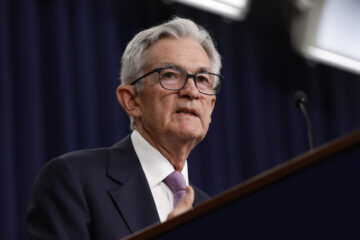Untouched by human hands.
It’s a phrase that’s often used to describe pristine, unspoiled or wild.
Related: Analyst reboots Microsoft stock price target on AI integration
However, the concept is taking on a different meaning these days in artificial intelligence and cybersecurity.
While security analysts warn that AI systems can be vulnerable to attack, AI can also reinforce cybersecurity by enhancing threat and phishing detection, quickly analyzing incidents, and simulating possible cyber-attacks.
A report by Techopedia found that businesses with comprehensive security AI solutions saw an average reduction in the cost of breaches of $1.8 million compared with those without such protections.
Nearly 70% of businesses said that AI was an essential security tool due to the many threats that humans alone cannot manage.
“Almost all cloud security breaches begin with human error,” Larry Ellison, Oracle (ORCL) chairman and chief technology officer, said last week. “Eliminating the possibility of human error is the only way to make certain your cloud data is not stolen. That’s it.”
Oracle Corporation CTO Larry Ellison. Analysts are reacting to the company’s recent earnings report.
Xaume Olleros/Getty Images
Oracle Chairman: robots eliminate human error
Ellison, who co-founded the company, spoke with analysts during the cloud service provider’s fourth-quarter earnings call.
AI played a big role in the company’s results, and Ellison described the security prowess of Oracle Cloud Infrastructure.
“At OCI, human beings do not run the operating system or the database,” he said. “Autonomous software robots do. No one else has this level of autonomy in the cloud. Eliminating human labor eliminates human error.”
Related: Analysts reset Nvidia stock price targets amid split, Dow entry talk
Ellison said that in artificial intelligence alone, Oracle signed contracts with 30 different customers for $12.5 billion in new AI business in the quarter.
The companies read like a who’s who in the tech sector, with names like Nvidia (NVDA) , Microsoft (MSFT) , Google (GOOGL) , ChapGPT creatorOpenAi, “and dozens more.”
“In other words, the world’s largest cloud companies and the world’s most successful and accomplished AI companies choose to use Oracle Cloud Services and data centers,” Ellison said.
Oracle posted fourth-quarter earnings of $1.63 per share on revenue of $14.29 billion. Analysts expected the company to earn $1.65 per share on $14.55 billion in sales. A year ago, Oracle earned $1.67 per share on $13.84 billion in revenue.
“Clearly, we had an absolutely incredible quarter,” CEO Safra Catz said during the call.
“As you know, Oracle’s Q4 is known for customers purchasing large software license contracts to power their businesses,” Catz added. “But because of the pivot to the cloud, this Q4 was powered by the enormous demand for our cloud services, and they showed up in RPO or remaining performance obligations.”
Catz said that during the quarter, Oracle “signed the largest sales contracts in our history, led by huge demand for training large language models, as well as record levels of sales for OCI, Autonomous, Fusion, and NetSuite.”
Looking ahead, Catz said total cloud revenue is expected to grow 20% to 22%, while adjusted earnings per share are expected to grow 10% to 14%, or $1.31 to $1.35.
Analyst notes ‘solid Cloud infrastructure bookings’
TheStreet Pro’s Stephen Guilfoyle said, “Wall Street was looking for something around $1.32 billion on $13.4 billion in revenue, which would be sales growth of just 7%, so this is strong guidance.”
Throughout fiscal year 2025, Kazt said he expected continued strong cloud demand to push Oracle sales and RPO even higher, resulting in double-digit revenue growth.
“Investors, traders, and algorithms alike all seem very excited about Oracle’s guidance and planned cooperation with both Microsoft and Google,” Guilfoyle wrote on June 12.
More AI Stocks:
Apple’s AI launch at WWDC could hinge on something it hates to doAnalyst revamps Microsoft stock price target despite controversyAnalysts race to reset HPE stock price targets as AI powers earnings
“Still, there’s this balance sheet that should be in much better shape than it is considering the size of the business and the cash flow it generates,” he added. “It is a black eye and one can easily see that a majority of sell-side analysts are simply not that impressed. Nor am I.”
Other analysts issued research notes on Oracle and adjusted their stock price targets.
BMO Capital analyst Keith Bachman raised Oracle’s stock price target to $160 from $142, keeping a market performance rating on the shares.
The company’s solid Cloud Infrastructure bookings for two successive quarters and a healthy FY2025 revenue guide compare favorably to the general tepid results in the firm’s software and IT services coverage universe, Bachman said.
Oracle has also moved into an “enviable position,” representing a unique combination of cloud infrastructure and enterprise software, the analyst added.
Deutsche Bank analyst Brad Zelnick raised the firm’s price target on Oracle to $165 from $150 and kept a Buy rating on the shares after incorporating fourth-quarter results and guidance into the firm’s model and adjusting FY2025-26 revenue and non-GAAP EPS estimates.
Argus analyst Joseph Bonner raised the firm’s price target on Oracle to $159 from $145 and kept a buy rating on the shares.
The company’s third-quarter results marked the first quarter in which rapidly growing cloud revenue became a higher proportion of total revenue than the company’s legacy license support revenue. The analyst said that could mean that cloud revenue will become an even bigger driver of total revenue in coming quarters.
The firm added that as the company races to invest in building out global data centers to meet demand, its management remains optimistic about the coming revenue acceleration in FY25.
Related: Veteran fund manager picks favorite stocks for 2024


